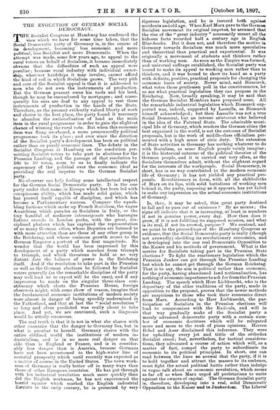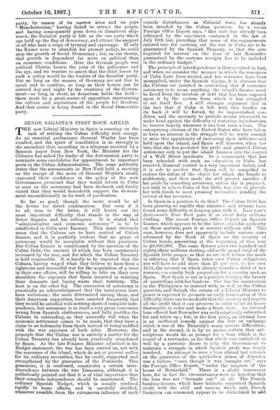THE EVOLUTION OF GERMAN SOCIAL DEMOCRACY.
Socialist Congress at Hamburg has confirmed the Tview which we have for some time taken, that the Social Democratic party of Germany is, in the course of its development, becoming' less economic and more political, less Socialist and more Democratic. When the attempt was made, some few years ago, to appeal to the rural voters on behalf of Socialism, it became immediately obvious that the difficulties of such an appeal were peculiar; because rural industry with individual owner- ship, whatever hardships it may involve, cannot afford the kind of soil in which Socialism grows. The very pith and core of the Socialist appeal is that it is addressed to men who do not own the instruments of production. But the German peasant owns his tools and his land, though he may be encumbered by mortgages ; and conse- quently his ears are deaf to any appeal to vest these instruments of production in the hands of the State. Therefore, as the peasant evidently valued liberty of work and choice in the first place, the party found it necessary to abandon the nationalisation of land as the main item in the rural programme in order to gain the slightest chance of winning the rural vote. But when this economic item was flung overboard, a more pronouncedly political programme took its place ; and ever since the direction of the Socialist party's development has been on political rather than on purely economic lines. The debate in the Socialist Congress at Hamburg on the resolution per- mitting Socialist voters to take part in elections for the Prussian Landtag, and the passage of that resolution by 160 to 50 votes, seem to us to finally indicate the supremacy of the political over the economic ideal as providing the real impetus to the German Socialist Party. No observer can help feeling some intellectual respect for the German Social Democratic party. It is the one party under that name in Europe which has been led with conspicuous ability, which has made solid gains, which has proved itself capable of discipline, and which has become a Parliamentary success. Compare the squab- bling factions which make up French Socialism, the vague Anarchism which parades as Socialism in Italy, or the tiny handful of mediocre intransigeants who harangue listless crowds in London parks, with the great, dis- ciplined phalanx which has captured the representation of so many German cities, whose Deputies are listened to with more attention than are those of any other group in the Reichstag, and whose ominous growth seems to the German Emperor a portent of the first magnitude. No wonder that the world has been impressed by this development of a party which marches from triumph to triumph, and which threatens to hold at no very distant date the balance of power in the Reichstag itself. And if the resolution to take part in the Prussian as well as the German elections be followed by Socialist voters generally (as the remarkable discipline of the party may well lead us to expect will be the case), and if any impression be made on the singular three.class con- stituency which elects the Prussian House, foreign observers might, with some show of reason, imagine that the fundamental economic institutions of modern society were almost in danger of being speedily undermined in the Fatherland, and that at last the "social revolution" so long and often predicted was really about to take place. And yet, we are convinced, such a diagnosis would be utterly erroneous.
The real truth is that it is not in what she shares with other countries that the danger to Germany lies, but in what is peculiar to herself. Germany shares with the entire civilised world the institutions of modern in- dustrialism, and is in no more real danger on that side than is England or France, and is in consider- ably less danger than is America, because Germans have not been accustomed to the high-water line of material prosperity which until recently was expected as a matter of course in the United States. The town work- man of Germany is really better off in many ways than those of other European countries. He has got through with his industrial revolution much more quickly than did the English workman, he has not experienced the ho. rrid squalor which marked the English industrial districts in the early century, he is protected by very rigorous legislation, and he is insured both against accidents and old age. When Karl Marx gave to the German Socialist movement its original impetus, he assumed that the rise of the "great industry" necessarily meant all the hideous facts recorded half a century ago in English Blue-books. But it does not, and therefore the motive in Germany towards Socialism was much more speculative and theoretical than practical and experiential. It was originally a movement of students and thinkers rather than of working men. As soon as the Empire was formed, and universal suffrage established, the Socialist party was bound to make its appeal to working men rather than to thinkers, and. it was bound to show its hand as a party with definite, positive, practical proposals for changing the economic basis of society. Never mind, said Bismarck, what votes these gentlemen poll in the constituencies, let us see what practical legislation they can propose in the Reichstag. Now, broadly speaking, it may be said that the German Socialist Members have proposed none. All the remarkable industrial legislation which Bismarck sup- ported was, indeed, suggested by Lassalle, as Bismarck himself acknowledged ; but then Lassalle was not a true Social Democrat, but an intense aristocrat who believed in the idea of the Paternal State. The admirable muni- cipal life of Germany, which renders the German cities the best organised in the world, is not the outcome of Socialist proposals, but is the work of middle-class officialism per- meated with a high sense of civic duty. The extension of State activities in Germany has nothing whatever to do with Socialism, as some English people vainly imagine ; it is the historical outcome of the political theories of the German people, and it is carried out very often, as the Socialists themselves admit, without the slightest regard for the interests of the workpeople. Social Democracy, in short, has in no way contributed to the modern economic life of Germany ; it has not yielded any practical pro- posals. Revolutionary in form, with all the shibboleths of Marx on its lips, with solid battalions of working men behind it, the party, imposing as it appears, has yet failed to make any impression on the actual economic institutions of Germany.
Is, then, it may be asked, this great party destined to fail and to pass out of existence ? By no means ; the signs all indicate that it is increasing, at least in numbers if not in genuine power, every day. How then does it grow, if it is not fulfilling its supposed mission, and what is its real, if not its avowed, purpose ? We contend, and we point to the proceedings of the Hamburg Congress as evidence, that the Social Democratic party is really (though not avowedly) shedding its revolutionary economics, and is developing into the one real Democratic Opposition to the Kaiser and his methods of government. What is the motive for Socialists taking part in the Prussian State elections ? To fight the reactionary legislation which the Prussian Junker can get through the Prussian Landtag but which he cannot get through the German Reichstag. That is to say, the aim is political rather than economic, for the party, having abandoned land nationalisation, has nothing of economic importance to ask for from the Prussian Landtag. The speech which Herr Liebknecht, who is the depositary of the older traditions of the party, made in opposition to the proposal, proves that the newer methods are suspicious to those who took their economics direct from Marx. According to Herr Liebknecht, the par- ticipation of Socialists in the Prussian elections will lead to compromises with the Radicals, and will in that way gradually make of the Socialist party a merely advanced democratic party with a certain num- ber of economic doctrines which will be relegated more and more to the rank of pious opinions. Herren Bebel and Auer disclaimed this inference. They were for upholding every jot and tittle of the orthodox Socialist creed; but, nevertheless, for tactical considera- tions, they advocated a course of action which will, as a matter of fact, compel the party to subordinate its economic to its political principles. In short, one can read between the lines an avowal that the party, if it is to hold together and attract the masses to its embrace, must fight the actual political battle rather than indulge in vague talk about an economic revolution, which seems as far off as when Marx urged all proletarians to unite against the owners of capital. The German Socialist party is, therefore, developing into a real, solid Democratic Opposition to the Kaiser and to Junkerdom. The Liberal party, by reason of its narrow aims and its pure Manchesterism," having failed to attract the people, and having consequently gone down in disastrous ship- wreck, the Socialist party is left as the one party which can hold up the flag of democracy, and attract the support of all who hate a reign of tyranny and espionage. If only the Kaiser were to abandon his present policy, he could stop the growth of Social Democracy ; for, on our theory, that growth is dependent far more on political than on economic conditions. Give the German people real political liberty, loosen the yoke of the policeman and the spy, and we venture to assert that the chief losers by such a policy would be the leaders of the Socialist party. But so long as the masses of Germany are not free to speak and to combine, so long as their homes can be entered day and night by the creatures of the Govern- ment—so long, in short, as despotism holds the field— there must be a great centre of opposition representing the culture and aspirations of the people for freedom. And that centre is being found in the Social Democratic party.







































 Previous page
Previous page